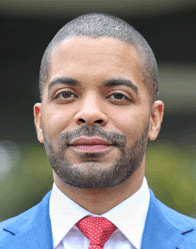Season 1 – Episode 10 – Human Subjects Research Ethics in Space
This episode addresses human subjects research in space, including the unique ethical and regulatory considerations.
Episode Transcript
Click to expand/collapse
Daniel Smith: Welcome to On Tech Ethics with CITI Program. Our guest today is Tom Salazar, who’s the Chief Research Oversight and Compliance Officer at the Travis Air Force Base in Northern California. Tom’s areas of expertise include bioethics and research compliance in topics such as psychedelic drugs, neuroscience, artificial intelligence, in space research. Today we are going to discuss human subjects research in space.
Before we get started, I want to quickly note that this podcast is for educational purposes only. It is not designed to provide legal advice or legal guidance. You should consult with your organization’s attorneys if you have questions or concerns about the relevant laws and regulations that may be discussed in this podcast. In addition, the views expressed in this podcast are solely those of our guest.
And on that note, welcome Tom. Can you tell us about your role and what you currently focus on?
Tom Salazar: Hello, my name is Tom Salazar. I’m currently a regulatory attorney focusing on research compliance with an educational background in neuroscience, and I’m currently the Chief Research Oversight and Compliance Officer at Travis Air Force Base, the clinical investigation facility in Fairfield, California, which is in Northern California. In this role, I provide oversight and guidance to the human protection and animal welfare programs by ensuring that the programs adhere to federal regulations and also state and international relations. I also facilitate research collaborations between Travis Air Force Base and other research entities, including the negotiation and drafting of collaborative research agreements.
Daniel Smith: Wonderful. Thank you, Tom. So as I mentioned, we’re here today to talk specifically about human subjects research in space. But first, can you quickly define human subjects research for our audience?
Tom Salazar: I have a working definition that I would give to listeners that are listening to the first time about this topic, which is I would think about it as a scientific investigation involving human beings as research subjects. However, you can get a lot more technical than that. I think we have a lot of regulatory bodies providing official definitions, and I think the most important one that we keep in mind as people working in the compliance field is the one by the Department of Health and Human Services regulations in 45 CFR 46.
So under DHHS regulations, human subjects research is systematic investigation designed to contribute to generalizable knowledge involving living individuals about who an investigator obtains data through intervention or interaction with the subject, or identifiable private information. And this definition is pretty comprehensive and it can be broken down even more into sub definition, so the definition of an interaction can be explored, and also the definition of what is identifiable private information can be explored.
But I think the basic working definition that most people in the compliance role go off of is just my scientific investigation that involves human beings as research subjects.
Daniel Smith: So with that in mind, how is human subjects research in space different than human subjects research on earth?
Tom Salazar: So the phrase human subjects research in space is using the same definition of human subjects research that we just went through. However, the difference is that the research is being conducted on space rather than on earth. And I think compared to earth, the biggest difference is that space is a dangerous and hostile environment. Space travelers such as astronauts are often exposed to harmful levels of radiation, microgravity, isolation, and confinement.
I also want to highlight that there currently isn’t an overarching regulatory body or set of regulations in space to protect human subjects. And this is because space is governed by international law, and currently the only legally binding document covering research activities in space is the Outer Space Treaty of 1966. And there is one clause in the Outer Space Treaty related to research that states that “there shall be freedom of investigation in outer space.” But this clause alone does not really provide ethical limits for human subject research in space. Because of this research, ethics in space has to rely on existing international standards like the Universal Declaration of Human Rights, the Nuremberg Code, and also the Declaration of Helsinki.
So right now we’re a little limited in terms of what is out there for researchers and participants to rely on when it comes to these ethical frameworks.
Daniel Smith: That’s really interesting. So, I want to get back to those ethical issues and frameworks here in a moment, but before doing so, can you share an example of a current or past study that involves human subjects research in space?
Tom Salazar: So, most human subjects research in space to date has been conducted aboard the ISS, or the International Space Station, and they have had a wide array of studies conducted there. There was a famous experiment recently finished called the NASA Twins Study where NASA compared the effects of space travel in an astronaut’s metabolism, genetics, cognition and physiology to his twin who remain on earth. And they found some interesting results that could potentially revolutionize aging research.
And there’s also been other studies exploring bone density, circadian rhythms and sleep patterns that have only been possible due to space’s unique environment. But I want to highlight that the ISS is a very unique place to conduct research in, because the ISS is governed by its own set of regulations. So they have, similar to the common rule in the United States, ISS has a body of regulations that governs the conduct of researchers and research participants in space, and that already has been established.
I think the concern is for research that goes on outside of the ISS, so for example, if we make a colony on the moon or make a colony on Mars, those are the research endeavors that currently there’s not really any guidance for because there hasn’t been any comprehensive treaty or comprehensive international ethic guideline focusing only on research in space. So thankfully, the research that has been going on the ISS has been covered under unethical guideline that’s specific to the ISS, it only applies to ISS research, but also is important to note that the ISS, according to NASA, is due to finish operations by the end of the decade.
So I think we need to start thinking about how to supplement, or how to maybe take the lessons learned from the ISS regulations and apply it to a more comprehensive document that would apply outside of the ISS to all research in space.
Daniel Smith: So, now that we’ve a better understanding of what human subjects research and space entails, can you tell us more about the unique ethical issues associated with this type of research?
Tom Salazar: So, there are a few key differences between human subjects research in space compared to Earth with regard to ethics. The first one is that space research presents special privacy and confidentiality concerns. Astronauts and other space travelers are usually high profile individuals, which means that their presence in space and their participation in research becomes widely known.
So, I’m sure you’ve seen in the media or even official statements by NASA, who is the next crew to go aboard a spaceship or go to the ISS. So everyone knows who’s going up to space right now, it’s the nature of the enterprise and this can cause privacy and confidentiality concerns. And not only that, even when we have researchers attempting to protect privacy and confidentiality, and for example, release research results anonymously, we have seen recently how artificial intelligence can be used to re-identify individuals from “anonymous data sets”.
So given the high profile of these individuals and just a limited pool that researchers have, it would be easy to use artificial intelligence to re-identify individuals just from a released ASF or a published study. For the foreseeable future there’s also very limited access to space, only professionals such as astronauts that have been carefully selected and wealthy individuals can currently engage in space flight. This means that the majority of space travelers today have been adult white men from countries like the United States and Russia, which presents a problem for research since that means that the available subjecting pool in space is not really representative of the world’s population. And this can present problems when attempting to generalize research results to the general population.
Research in space can also present a unique undue influence and conflict of interest challenges. You could argue that space travelers or people that typically have worked their whole lives to become an astronaut, or like many of us have always dreamed of going to space, they have an incentive to enroll or remain in research conducted by these enterprises that have enabled their space travel. There’s also undue influence concerns depending on the type of compensation given to participants in space, which is an environment known for having scarce resources.
So I can think of a very outline example, but it gets the point across. Say for whatever reason there’s no chocolate in space or in a colony, but you have a researcher offering chocolate as compensation for participation, you could see how that would be unduly coercive and would probably get a lot more people enrolling in the research that they would otherwise, given that they’re given for compensation, a very scarce resource.
Finally, I think there’s also potential issues with intellectual property and data ownership. Another clause of the Outer Space Treaty is that the use of outer space shall be for the benefit of all mankind. And this language really leaves open to interpretation who owns data from research conducted in space, [inaudible 00:10:28] some additional guidance. So without any other treaty or international legal document to expound upon this provision in the Outer Space Treaty, it’s really unclear what will happen with basically the fruits of our labor in space.
Daniel Smith: So I’m wondering how well do our current ethical frameworks and standards address those issues? But first I want to take a quick break to tell you more about CITI Program’s professional development opportunities. We offer courses and webinars that explore topics across diverse professional areas that are meaningful to both early career and experienced individuals. Visit citiprogram.org for more information.
Now, let’s hear more from Tom about how well our current ethical frameworks and standards address the unique ethical issues associated with human subjects research in space.
Tom Salazar: So, if we rely on existing international standards and frameworks to address these ethical issues, I think we’ll run into some problems. So I mentioned earlier there’s three main international standards or ethical frameworks that we currently rely on, and the first one is the Universal Declaration of Human Rights. The problem with the University Declaration of Human Rights is that it’s not really comprehensive enough, at least within the realm of research. It only has one clause related to human experimentation, and arguably the clause only applies to medical research. This means that the social and behavioral research in space might not be covered under the framework, and it just really does not provide enough guidance for researchers and research participants alike to be able to know how to conduct themselves ethically.
If we go on to the Nuremberg Code, it’s a lot more comprehensive and a lot more on point to research ethics, that outlines 10 ethical principles, mostly focusing on informed consent, risk assessment, voluntary participation, and voluntary withdrawal from research. Informed consent in the context of space is actually rather tricky because we have very limited knowledge of space’s dangerous and the unknown potential effects of space’s radiation, microgravity, confinement. On human health, this means that researchers are not able to provide a complete overview of the risks participants may encounter during research in space.
There’s also undue influence and coercion pressures, which I mentioned earlier, and these pressures may compromise the research subjects voluntary participation in research, but there’s also risk assessment issues, because as I mentioned earlier, space is very hostile to humans, so it would be hard to potentially balance the risks and benefits of a research when making risk assessments in this context.
One of the latest international guidelines is the Declaration of Helsinki, and it expands upon the ethical principles in the Nuremberg Code. The Declaration of Helsinki mandates manifesting risk for research subjects, risk assessment throughout the research, providing additional protections to vulnerable participants, obtaining informed consent from all participants, and maintaining the privacy and confidentiality of research subjects.
So the clause about equitable selection of research [inaudible 00:13:49] is compromised because there is such a limited pool of participants in space, which means that wealthy individuals and astronauts will generally have first access to any new developments in medicine and technology from space research. There’s also what I mentioned earlier, that because the population is not representative of the world, there will be issues generalizing the data.
There’s also the question of whether space travelers can be considered a vulnerable population which would require additional protections. I think this could be argued either way, but if space travelers are considered a vulnerable population, the declaration states that research in space would only be justified if it’s responsive to the health needs or priorities of this population, so the health needs and priorities of astronauts or space travelers. This means that research IN space would be limited to studies that provide only direct benefits to astronauts and space travelers rather than people on earth, which I think would defeat the purpose of a lot of these features. We want to also help and move forward things on earth.
There’s also the question about maintaining privacy and confidentiality, which as I mentioned earlier, can prove pretty difficult in the early stages of space exploration, given the number of people that go there and how much of a high profile and media attention these astronauts and wealthy individuals that get to go to space get.
One important thing I want to know is that all countries basically have relied on these three international frameworks when creating their own set of human research ethics regulations. However, there has been the lack of consensus about whether application of these principles can permit certain types of research. Many countries have varying stances on, for example, cloning research, biological and chemical warfare research, research involving non-viral fetuses and neonates, so this ambiguity interpretation signals that these frameworks alone are maybe not enough to guide research ethics in space, and we need a new framework that is specific to research in space, and more on point to the unique ethical needs of research ethics in space.
Daniel Smith: Now, in terms of those guidelines that would address these unique ethical issues, what do you think they should address specifically?
Tom Salazar: So, I think our best solution moving forward is creating a new set of ethical guidelines, but it should be an international treaty because that is the only way that we can guarantee that the set of guidelines is legally binding. The Nuremberg Code, the Universal Declaration of Human Rights, the Declaration of Helsinki, these are just guidelines and ethical codes meant to guide but not really meant to be legally binding. So you as a country, you can say I’m following these codes, but if you go against them, there’s not really any legal repercussion because they’re not legally binding. But if we have a treaty that says specific things related to research ethics in space and you do something that’s against those guidelines, then there can be legal repercussions.
So, I think that the best way to go about this is to have a new treaty that expands upon the freedom of scientific investigation provision and the Outer Space Treaty. Since the Outer Space Treaty’s inception, the United Nations has brokered multiple supplemental treaties that expands on a lot of the big provisions in the Outer Space Treaty. So there has been a rescue provision in the Outer Space Treaty, a liability provision in the Outer Space Treaty, and also a registration provision in the Outer Space Treaty.
So, given that we are entering a new era of space exploration and space research in the new future, I think now is the best time as ever to work on a new multilateral international treaty establishing the rights and obligations for scientists in research [inaudible 00:17:48] in space. I think the treaty should address many of the novel ethical challenges that we just discussed. For example, the treaty should include a provision that would prohibit researchers from recruiting participants on earth for research to be conducted in space. So for example, if we have a pharmaceutical company wanting to conduct a clinical trial in space and they need a hundred cancer patients, I don’t think they should be allowed to basically coerce people on earth to go to space just so that they can meet their numbers. They should only be able to work with the population that’s already in space, and this is to prevent unnecessary exposure to the dangers of space to research participants.
The treaty should also require preclinical studies to assess potential risks and harms to human participants in space prior to conducting full trials. So this is something similar to the ethical protections for pregnant people and fetuses in the common rule, which require preclinical studies before pregnant people and the fetuses are subject to the actual trial. To address privacy and confidentiality concerns, I think the treaty should require something similar to a COC, or what’s called a Certificate of Consensuality in the US. And this prevents researchers when granted from compelled disclosure of identifiable research data in official proceedings. So I think this would just be a method to provide additional privacy protections to participants, and I think the treaty should also require that only collective data as opposed to individual participants data is reported in publications as an additional privacy measure.
I think the treaty should also address space’s limited subject tool by requiring researchers to follow many published guidelines for small sample clinical trials. And these guidelines include defining the research scope early in the research, tailoring the research design for small populations, performing corroborative physical analysis and exercising great caution when interpreting research results.
As we continue to see the human population in space increase, I think it’s probably a good idea to have the treaty have a clause in there that will revisit these requirements every few years to assess whether they’re still needed. To address potential coercion and undue influence concerns, I think, as I mentioned earlier, there should be a limit to research participant compensation. So I think the compensation should be limited to only money or things that act like money, such as any currency. This should be done to prevent researchers from abusing scarce resources and convince people to participate in the research.
I also think the treaty should impose limitations on authority figures for the recruitment of research participants. It’s very likely that space travelers may interpret recruitment efforts by an authority figure as an expectation to participate, rather than a voluntary request. And we’ve seen the power of authority in many studies in the past, I just think based on what we know about people’s tendency to follow authority figures, that having someone in an authority position recruit participants would be unduly coercive.
Finally, I think the treaty should establish ethical rewards in space similar to IRBs, or Institutional Review Boards on Earth in the United States, and actually many countries have IRBs as well, which would act as a specialist in the unique ethical challenges associated with research in space. Like IRBs, I think these ethical review boards should have the ability to approve and disapprove research prior to research onset, and monitor research as research continues, post-approval, evaluate COIs, or Conflict of Interest, and provide additional safeguards as needed. Combined with the ethical boards in space, I think these measures will minimize potential research abuse in space and foster public trust in the space research enterprise.
Daniel Smith: For those of us who are interested in learning more about those ideas, are there any additional resources we can check out?
Tom Salazar: Yeah, so I’m actually really interested in this topic and really passionate about it, and I recently published an article on this topic called Space Exploration, the Outer Space Treaty and the Future of Human Subject Research Ethics with the American University Washington College of Law. And this article I can provide to listeners that reach out to me directly via email, but there’s also other resources that I think could be useful if you’re really interested in this topic.
I would recommend reading the Outer Space Treaty of 1966, and this treaty basically is the Magna Carta of outer space law. There’s also 14 CFR section 1214.403, and this is a code of conduct that space travelers aboard the ISN have to follow. So it’s an international body of law that we can refer to as well when creating a new treaty or a new set of guidelines.
Daniel Smith: That’s great. And I will certainly include Tom’s email in our show notes so you all can reach out and learn more. And on that note, do you have any final thoughts you would like to share with our audience that we did not already touch on?
Tom Salazar: Yeah, I think I would like to conclude by saying that the rise of space exploration really has profound implications for that feature of human subject ethics, and not only on earth, but also in space. And I think this conversation may seem a little premature, but now is the right time to be thinking and talking about these ethical issues. We’ve seen how research abuse ran rampant around the world before the international community developed codes like the Nuremberg Code and the Declaration of Helsinki. I think moving forward international space law must ensure that there’s progress in space exploration in science is not made at the expense of vulnerable research participants in space.
Daniel Smith: Thank you again, Tom. And thanks to our listeners for tuning in for today’s conversation. I invite you to visit citiprogram.org to learn more about our courses that address technology ethics, human subjects research and more. And with that, I look forward to bringing you all more conversations on all things Tech Ethics.
How to Listen and Subscribe to the Podcast
You can find On Tech Ethics with CITI Program available from several of the most popular podcast services. Subscribe on your favorite platform to receive updates when episodes are newly released. You can also subscribe to this podcast, by pasting “https://feeds.buzzsprout.com/2120643.rss” into your your podcast apps.
Recent Episodes
- Season 1 – Episode 9: Impact of Recent Social Media Platform Changes
- Season 1 – Episode 8: Understanding Big Health Data Research’s Unique Issues
- Season 1 – Episode 7: Navigating Big Data and Data Science Research Ethics
- Season 1 – Episode 6: Bots in Survey Research
Meet the Guest

Tom Salazar, JD, MS, CIP – Travis Air Force Base
Tom Salazar is the Chief Research Oversight and Compliance Officer at Travis Air Force Base in Northern California. He has developed multiple publications on bioethics and research compliance, with topics ranging from psychedelic drugs to neuroscience, artificial intelligence, and space research.
Meet the Host

Daniel Smith, Associate Director of Content and Education and Host of On Tech Ethics Podcast – CITI Program
As Associate Director of Content and Education at CITI Program, Daniel focuses on developing educational content in areas such as the responsible use of technologies, humane care and use of animals, and environmental health and safety. He received a BA in journalism and technical communication from Colorado State University.











